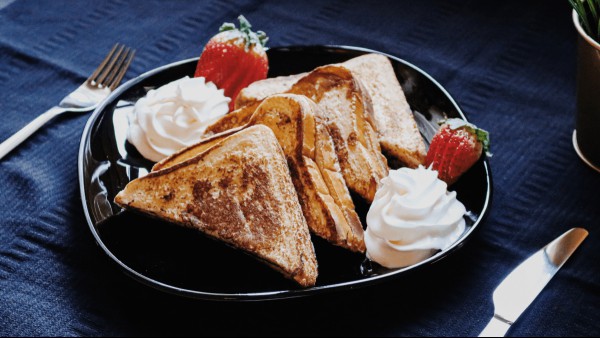139 Old Norse Words That Invaded The English Language
Modern English is commonly thought of as a West Germanic language, with lots of French and, thanks to the church, Latin influence thrown in the mix. But this take on English leaves out a very important piece of the linguistic puzzle: Old Norse, the language of the Vikings. The English we speak today is riddled with lingual remnants leftover from a time when wearing ornately-decorated helmets was all the rage. Let’s take a look at some Old Norse words that have withstood the test of time by fighting their way into our modern vocabulary.
How To Speak Viking
The Old Norse word víking meant an overseas expedition, and a vikingr was someone who went on one of these expeditions. In the popular imagination, the Vikings were essentially pirates from the fjords of Denmark and Norway who descended on medieval England like a bloodthirsty frat party — they pillaged, murdered and razed villages, only to sail right back across the North Sea with their loot.
Reality is far more nuanced, though. The earliest Viking activity in England did consist of coastal raids, but by the 870s, the Danes had traded sword for plow and were settled across most of Northern England in an area governed by treaties known as the Danelaw. England even had Danish kings from 1018 to 1042. However, the more successful and longer-lasting Norman conquest in 1066 marked the end of the Viking era and virtually erased Danish influence in almost all aspects of English culture but one: its effect on the development of the English language.
Traust me, þó (though) it may seem oddi at first, we er still very líkligr to use the same words the Vikings did in our everyday speech. Þeirra (their) language evolved into the modern-day Scandinavian languages, but þeir (they) also gave English the gift of hundreds of words.
[A note on the letter þ: the Old Norse letter, called thorn, makes the same sound as the “th” in “thin”.]
Days Of The Week
The most obvious Old Norse influence on modern English is the word Thursday (Þorsdagr), which you might guess means “Thor’s day.”
“Tuesday,” “Wednesday” and “Friday” are sometimes also attributed to the Norse gods Tyr, Odin and Freya respectively, but the weekdays are actually named for the Anglo-Saxon equivalents of these gods, Tiw, Wodan and Friga. The similarity of these names points to the common ancestry shared by the various Germanic tribes in prehistoric northern Europe, centuries before their descendants clashed on England’s shores.
War And Violence
If the Vikings are famous for one thing, it’s their obsession with war. They didn’t just bring death and destruction to medieval England, they brought really cool words for death and destruction. They were certainly a rough bunch. Just look at a Viking the rangr (wrong) way, and he might þrysta (thrust) a knifr into your skulle.
Here are some more violent Old Norse words we can thank the Vikings for:
| English | Old Norse | Meaning |
| berserk | berserkr | lit. a “bear-shirt” a Viking warrior who entered battle wearing nothing for armor but an animal skin |
| club | klubba | a heavy, blunt weapon |
| gun | gunn | from the female name Gunnhildr: gunn (war) + hildr (battle) |
| ransack | rannsaka | to search a house |
| scathe | skaða | to injure |
| slaughter | slatra | to butcher |
Society And Culture
Life in the Danelaw wasn’t all murder and mayhem, of course. Ironically, these savage berserkers also gave us many Old Norse words now central to our more “civilized” culture:
| English | Old Norse | Meaning |
| bylaw | bylög | village-law |
| heathen | heiðinn | one who inhabits the heath or open country |
| Hel | Hel | Loki’s daughter and ruler of the underworld |
| husband | húsbóndi | hús (house) + bóndi (occupier and tiller of soil) |
| law | lag | |
| litmus | lit-mosi | litr (dye) + mosi (moss) |
| loan | lán | to lend |
| sale | sala | |
| skill | skil | distinction |
| steak | steik | to fry |
| thrall | þræll | slave |
| thrift | þrift | prosperity |
| troll | ||
| saga | ||
| yule | jol | a pagan winter solstice feast |
Animals
Although most English animal names retain their Anglo-Saxon roots (cow, bear, hound, swine, chicken, etc.), the Vikings did bring a few Old Norse words to our animal vocabulary:
| English | Old Norse | Meaning |
|---|---|---|
| bug | búkr | an insect within tree trunks |
| bull | boli | |
| reindeer | hreindyri | |
| skate | skata | a kind of fish |
| wing | vængr |
Some words associated with hunting and trapping also come from the Vikings. Sleuth now means “detective,” but the original slóth meant “trail” or “track.” Snare, on the other hand, retains the original meaning of the Old Norse snara.
Landscape
Old Norse words are good for describing bleikr landscapes and weather. This was especially useful in Viking-inhabited northern England, where both flatr and rogg (rugged) terrain are often shrouded in fok, and oppressed by gustr of wind and lagr (low) ský (clouds).
Much of the Danelaw bordered swamps and alluvial plains, so it’s no surprise that many Old Norse words for dirty, mucky things still survive in English:
| English | Old Norse | Meaning |
|---|---|---|
| dirt | drit | excrement |
| dregs | dregg | sediment |
| mire | myrr | bog |
| muck | myki | cow dung |
| rotten | rotinn |
The Norse Legacy In English
Thanks to the cross-cultural fermentation that occurred in the Danelaw, the English language is much closer to those of its Scandinavian neighbors than many acknowledge. By the time the Norman conquest brought the irreversible influence of French, Old English had already been transformed beyond its Anglo-Saxon roots.
This is still in evidence today: Modern English grammar and syntax are more similar to modern Scandinavian languages than to Old English. This suggests that Old Norse didn’t just introduce new words, it also influenced how the Anglo-Saxons constructed their sentences. Some linguists even claim that English should be reclassified as a North Germanic language (along with Danish, Norwegian, Icelandic and Swedish), rather than a West Germanic language (with Dutch and German). The Viking influence may be most apparent in the Yorkshire dialect, which uses even more Old Norse words in daily speech than standard English does.
English is probably too much of a hybrid to ever neatly classify, but its Old Norse rót is clearly there among the tangle of Anglo-Saxon, French and Latin roots. The language of the Vikings may have become subdued over the centuries, but make no mistaka about it: from byrðr (birth) undtil we deyja (die), Norse’s raw energy simmers under the surface of everything we say.
More Old Norse Words
We use Old Norse words every day without even realizing it.
Verbs
| English | Old Norse | Meaning |
|---|---|---|
| bark | bǫrkr | |
| bask | baðask | reflexive of baða, “to bathe” |
| billow | bylgja | |
| blunder | blundra | to shut one’s eyes; to stumble about blindly |
| call | kalla | to cry loudly |
| cast | kasta | to throw |
| choose | kjósa | |
| clip | klippa | to cut |
| crawl | krafla | to claw |
| gawk | ga | to heed |
| get | geta | |
| give | gefa | |
| glitter | glitra | |
| haggle | haggen | to chop |
| hit | hitta | to find |
| kindle | kynda | |
| race | rás | to move swiftly |
| raise | reisa | |
| rid | rythja | to clear land |
| run | renna | |
| scare | skirra | |
| scrape | skrapa | |
| snub | snubba | to curse |
| sprint | spretta | to jump up |
| stagger | stakra | to push |
| stain | steina | to paint |
| stammer | stemma | to hinder; to dam up |
| sway | sveigja | to bend; to give way |
| take | taka | |
| seem | sœma | to conform |
| shake | skaka | |
| skip | skopa | |
| thwart | þver | across |
| want | vanta | to lack |
| whirl | hvirfla | to go around |
| whisk | viska | to plait or braid |
Objects
| English | Old Norse | Meaning |
|---|---|---|
| axle | öxull | axis |
| bag | baggin | |
| ball | bǫllr | a round object |
| band | band | rope |
| bulk | bulki | cargo |
| cake | kaka | |
| egg | egg | |
| glove | lofi | the middle of the hand |
| knot | knutr | |
| keel | kjölr | |
| link | hlenkr | |
| loft | lopt | air; sky; upper room |
| mug | mugge | |
| plow, plough | plogr | |
| raft | raptr | log |
| scale (for weighing) | skal | bowl; drinking cup |
| scrap | skrap | |
| seat | sæti | |
| skirt | skyrta | shirt |
| want | vondr | rod |
| window | vindauga | lit. “wind-eye” |
Adjectives
| English | Old Norse | Meaning |
|---|---|---|
| aloft | á + lopt | on + loft; sky; heaven |
| ill | illr | bad |
| loose | lauss | |
| sly | sloegr | |
| scant | skamt | short; lacking |
| ugly | uggligr | dreadful |
| weak | veikr |
The Body
| English | Old Norse | Meaning |
|---|---|---|
| freckles | freknur | |
| foot | fótr | |
| girth | gjörð | circumference |
| leg | leggr | |
| skin | skinn | animal hide |
People
| English | Old Norse | Meaning |
|---|---|---|
| fellow | felagi | |
| guest | gestr | |
| kid | kið | young goat |
| lad | ladd | young man |
| oaf | alfr | elf |
Emotions
| English | Old Norse | Meaning |
|---|---|---|
| anger | angr | trouble; affliction |
| awe | agi | terror |
| happy | happ | good luck; fate |
| irk | yrkja | to work |
RECOMMENDED NEWS

Are These 10 ‘French’ Things Actually French?
Americans really like French things. It’s pretty established. We like cooking French, dressing Frenc...

The 20 Most Common English Verbs
Every sentence needs a verb. Otherwise, it not grammatical. The English language technically has tho...

What’s The Difference Between African And European French?
France, as you can tell from the name alone, is where the French language has its home. Yet if you’r...

How To Address People In Russian
Whether you’re learning Russian to connect with family or to meet new people, you’ll need to learn h...

Is ‘President’ Capitalized?
As language enthusiasts, we often find ourselves pondering the finer points of grammar and punctuati...

From Classroom to Career: The Power of Education in Paving the Path to Success
The importance of education in today’s society Education is the cornerstone of modern society. It p...
Comments on "139 Old Norse Words That Invaded The English Language" :